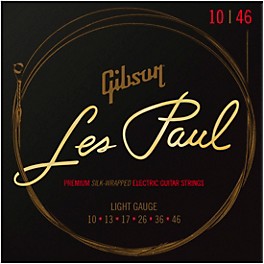Gibson Electric Guitar Strings
Best Match
8 matches found
- Previous
- 1
- Next
One of the most important things to look at when choosing strings is the material, just like with an acoustic guitar. The difference is that an electric guitar's strings need to be made of magnetic alloys for the pickups to "hear" them, so bronze and brass are out. Instead, your primary options are stainless steel, nickel or nickel-plated strings. Nickel alloys have their roots in the early electric guitars of the 1950s, which makes them the preferred choice for authentic vintage sounds. Steel, on the other hand, has a stronger, punchier sound. Steel strings also stand up well to corrosion, which makes them good options if you live in a humid climate. For a hybrid of the two, check out nickel-plated strings, which combine the clarity and strength of steel with a softer nickel surface that's a bit easier on your frets, picks and fingertips. The other key characteristic of electric guitar strings is the gauge, or thickness. A heavier gauge needs more tension and produces higher volume with fuller sound and increased sustain. That makes it ideal for the needs of rhythm guitar. Lighter gauges, by contrast, are brighter-sounding, as well as more flexible, which allows fingers to work faster, making them great for complex lead and jazz guitar parts. If you're a beginner, it's a good idea to start with a lighter gauge, since the more bendy strings are easier to fret. A final thing to take into consideration is whether the strings are coated. Some guitarists prefer standard strings, while others like coated ones for their longer lifespan, smoother texture that produces less squeak and the choice of colors to personalize the guitar. Your electric guitar strings are a matter of individual preference, so trying out different strings is the only way to reliably decide which you'll like best. But it's worth every moment of testing, since your choice of strings can make an unbelievable difference in the sound of your guitar.

